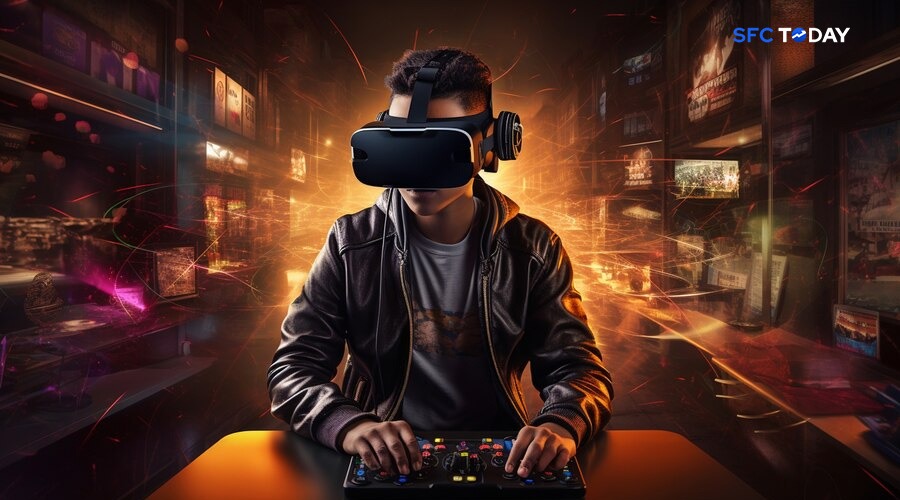This article explores the potential of blockchain in gaming
In recent years, the integration of blockchain technology into various sectors has sparked significant interest and innovation. One area where blockchain is beginning to make a profound impact is in the gaming industry. This article explores the potential of blockchain in gaming, its current applications, benefits, challenges, and whether it represents the future of virtual economies.
Introduction to Blockchain in Gaming
Blockchain technology, best known as the underlying technology behind cryptocurrencies like Bitcoin and Ethereum, offers decentralized, transparent, and secure systems for recording transactions and managing digital assets. In gaming, blockchain’s decentralized nature and cryptographic security mechanisms have the potential to revolutionize how virtual assets, economies, and interactions are managed within games and virtual worlds.
Current Landscape of Blockchain Gaming
As of 2024, blockchain in gaming encompasses a diverse range of applications and use cases:
Digital Asset Ownership: Blockchain allows gamers to truly own and control their in-game assets through non-fungible tokens (NFTs) and decentralized marketplaces. This ownership extends beyond individual games, enabling interoperability and asset portability across different platforms.
Tokenization of Virtual Economies: Game developers can tokenize in-game currencies, items, and assets on blockchain networks, providing transparency and traceability of transactions while reducing fraud and counterfeit items.
Player-driven Economies: Blockchain-powered games enable players to earn real-world value for their time and skills by participating in player-driven economies, trading assets, and earning cryptocurrencies through gameplay and contributions to game ecosystems.
Enhanced Security and Anti-cheat Mechanisms: Blockchain’s immutable ledger and cryptographic security features help combat cheating, fraud, and unauthorized modifications in online multiplayer games, ensuring a fair and secure gaming environment.
Decentralized Gaming Platforms: Platforms leveraging blockchain technology offer decentralized infrastructure for hosting and distributing games, reducing dependency on centralized servers and enhancing network resilience.
Benefits of Blockchain in Gaming
The adoption of blockchain technology in gaming brings several notable advantages:
True Ownership: Players have verifiable ownership of digital assets and can trade them freely on blockchain-based marketplaces, fostering a vibrant secondary market for virtual goods.
Transparency and Security: Blockchain’s decentralized ledger ensures transparency of transactions and reduces the risk of fraud, hacks, or data breaches common in centralized gaming ecosystems.
Interoperability: Games and virtual assets tokenized on blockchain can be interoperable across multiple platforms and games, enabling seamless asset transfer and cross-game experiences.
Economic Empowerment: Blockchain-powered games empower players economically by enabling them to earn cryptocurrencies, tokens, or valuable digital assets through gameplay, fostering a more sustainable gaming ecosystem.
Challenges and Considerations
Despite its promise, blockchain integration in gaming faces several challenges:
Scalability: Blockchain networks, such as Ethereum, face scalability issues that limit the speed and volume of transactions, impacting real-time gameplay and mass adoption of blockchain games.
User Experience: Blockchain technology can introduce complexity for mainstream gamers unfamiliar with digital wallets, private keys, and blockchain transactions, requiring improved user interfaces and education.
Regulatory Uncertainty: Regulatory frameworks surrounding cryptocurrencies and virtual assets vary globally, posing challenges for game developers and platforms navigating legal compliance and regulatory requirements.
Environmental Concerns: Proof-of-Work (PoW) consensus mechanisms used by some blockchains consume significant energy, raising concerns about the environmental impact of blockchain gaming.
Case Studies and Examples
Several blockchain-powered games and platforms have demonstrated the potential and practical applications of blockchain in gaming:
Axie Infinity: A blockchain-based game where players breed, battle, and trade digital creatures (Axies) using Ethereum-based NFTs, earning in-game rewards and tokens.
Decentraland: A virtual reality platform built on Ethereum blockchain, allowing users to create, explore, and monetize virtual spaces and assets using MANA tokens.
CryptoKitties: One of the earliest blockchain games, where players collect, breed, and trade virtual cats using Ethereum-based NFTs, highlighting the concept of digital scarcity and ownership.
Enjin: A platform providing tools for game developers to integrate blockchain technology, enabling tokenized in-game assets, virtual economies, and player-driven ecosystems.
The Future of Blockchain in Gaming
Looking forward, blockchain technology is poised to play an increasingly integral role in shaping the future of gaming:
Mainstream Adoption: As blockchain scalability improves and user-friendly interfaces are developed, blockchain-powered games could attract a broader audience, including traditional gamers and developers.
Innovative Game Design: Blockchain enables new gameplay mechanics, economic models, and decentralized governance structures that promote creativity, innovation, and community engagement in game development.
Integration with Metaverse and Virtual Reality: Blockchain’s ability to tokenize virtual assets and facilitate secure, decentralized transactions aligns with the vision of interconnected virtual worlds and metaverses, where digital economies thrive.
Regulatory Clarity and Market Maturity: Continued regulatory clarity, technological advancements, and market maturation are essential for widespread adoption and sustainable growth of blockchain gaming ecosystems.
Conclusion
In conclusion, blockchain technology holds immense potential to transform the gaming industry by empowering players with true ownership of digital assets, fostering decentralized economies, and enhancing security and transparency in virtual interactions. While challenges such as scalability, user experience, and regulatory uncertainty remain, ongoing innovation and adoption efforts are paving the way for blockchain-powered games to become a cornerstone of the future virtual economy. As developers, investors, and gamers embrace the opportunities presented by blockchain, the convergence of technology, creativity, and community engagement promises to redefine the boundaries of gaming and virtual worlds in the years to come.


